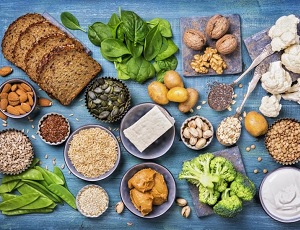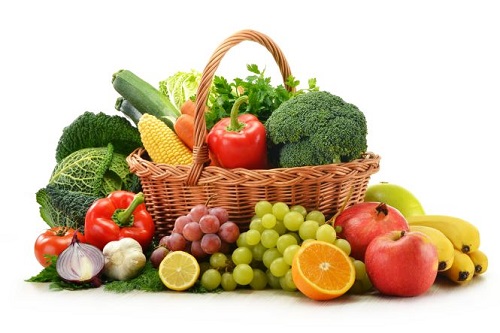
Vegetarianism, including its different varieties (such as veganism), is becoming more and more popular in our society. As the number of people giving up meat is growing, so are the controversies surrounding this kind of diet. To distinguish facts from myths, members of the Polish Pharmaceutical Students’ Association from the Jagiellonian University Medical College decided to confront some of the frequently made claims with modern medical knowledge.
To resolve all the doubts, the Polish Pharmaceutical Students’ Association launched the VegeDay initiative, which comprises a series of expert lectures. Here is the scientific clarification of some of the most common statements about vegetarianism.
1. The sufficient amount of protein can only be provided by a diet that includes meat.
Actually, plants are a great source of protein. Some of them, like soy, peas, and buckwheat even belong to high-protein products. Protein deficiency is prevented by providing the body with a wholesome diet, which needn’t necessarily include meat.
Yet, it should be remembered that eating too much protein (more than 2 grams a day per kilogram of body weigh) can have adverse health effects, especially for the urinary tract. Together with protein, the body is provided with nitrogen compounds, which are then filtered out and removed from the blood by kidneys. Excessive amounts of these substances require greater effort by these organs as well as greater use of calcium, which neutralises urea produced during this process. As a result, the amount of calcium in urine increases, which, in the long term, can lead to the formation of kidney stones.
2. There is little iron in plant products, which leads to anemia.
Such products as soy (8.9 miligrams/100 grams), bean (4.7-6.9 mg/100 g), oat flakes (3.9 mg/100 g), and pistachios (6.7 mg/100 g) are rich in iron, but the problem lies in its absorption. Iron can be delivered to the body in two different forms: as heme iron (found in meat, including offal) and non-heme iron (found in plants). The former is much better absorbed by the body than the latter. The absorption of heme iron is estimated at about 20% and of non-heme iron – only at about 5%. This stems from the fact that heme iron is much better available to body cells under alkaline conditions that exist in the small intestinal lumen.
 On the other hand, a lot of fruit and vegetables are a rich source of vitamin C, which increases the absorption of iron. Hence, a proper combination of plant products (e.g. tomatoes with soy, oat flakes with oranges, blueberries and kiwi) can facilitate the absorption of this element. Some iron rich vegetables also possess this feature, like, for instance, parsley (6.2 mg iron/100 g; 178 mg vitamin C/100g), Brussels sprout (1.40 mg iron/100g; 85 mg vitamin C/100g), and kale (1.47 mg iron/100g; 120 mg vitamin C/100g). Yet, it needs to be noted that overly long cooking significantly lowers the amount of vitamin C in vegetables (even by 60%, which results from its high solubility), and hence steaming is the preferable cooking method.
On the other hand, a lot of fruit and vegetables are a rich source of vitamin C, which increases the absorption of iron. Hence, a proper combination of plant products (e.g. tomatoes with soy, oat flakes with oranges, blueberries and kiwi) can facilitate the absorption of this element. Some iron rich vegetables also possess this feature, like, for instance, parsley (6.2 mg iron/100 g; 178 mg vitamin C/100g), Brussels sprout (1.40 mg iron/100g; 85 mg vitamin C/100g), and kale (1.47 mg iron/100g; 120 mg vitamin C/100g). Yet, it needs to be noted that overly long cooking significantly lowers the amount of vitamin C in vegetables (even by 60%, which results from its high solubility), and hence steaming is the preferable cooking method.
Substances hindering the absorption of iron include polyphenols found in tea or coffee, phytates found in bran, as well as large amounts of fibre or calcium. This means that products containing these substances shouldn’t be combined with iron-rich meals.
3. Vitamin B12 can only be found in meat.
Vitamin B12 is present not only in meat and fish products, such as cooked veal liver (74 µg/100g), cooked minced beef (3.3 µg /100g), cooked ham (0.94 µg /100g), cooked chicken breast (0.4 µg /100g), smoked herring (18.7 µg/100g), or cooked smoked red salmon (5.87 µg /100g), but also in other animal products, such as eggs (0.6 µg/1 hard boiled egg), soft cheese (2.1 µg/100g), or milk (0.48 µg/100ml). Thus, people who have these products included in their daily diet rarely suffer from its deficiency.
The problem of vitamin B12 deficiency more often affects vegans, as this substance cannot be found in plant products. According to the EPIC-Oxford study, only 7% of vegetarians and as many as 52% of vegans suffer from this problem. This means that people who abstain from all animal products require B12 supplementation, as this substance is essential for maintaining good health, because it takes part in the production of erythrocytes (red blood cells) and has an impact on the general condition of the nervous system. Its deficiency is manifested by fatigue, weakness, loss of appetite, numbness of limbs, memory problems, headaches, and vision disorders.
4. Vegetarianism, and especially veganism, isn’t recommended to children and pregnant women.
According to the 2016 statement by the US Academy of Nutrition and Dietetics, a properly balanced vegetarian, including vegan, diet is appropriate for all stages of life cycle. However, the impact of vegetarianism on human health requires further research. The majority of doctors think that vegetarian diet can be safely followed by children and pregnant women, but some of them have serious doubts whether the same can be said about veganism, suggesting that children following this type of diet may suffer from deficiency of B12, calcium, zinc, and other substances, which, in turn, can lead to a number of developmental disorders, such as anemia, thrombocytopenia, muscle weakness, psychomotor development delay, balance disorders, concentration problems, and impaired immunity. As the safety of veganism remains a matter of controversy, children and pregnant women who follow vegan diet definitely require medical supervision.
5. Plant based diet is detrimental to athletes.
Research has shown that eliminating meat and other animal products from diet in itself does not reduce athletic performance, as plant products are capable of providing the body with high amount of protein, which is essential for athletes. Bearing in mind that protein in many plant products is slightly more difficult to digest, it should be ensured that at least 3 meals a day include products rich in protein, which should account for at least 20% of the total energy intake. The advantages of plant-based diet include the fact that it provides large amounts of antioxidants, which protect the body from the negative impact of free radicals, as well as magnesium, potasium and zinc, which help muscles to regenerate.
6. Vegetarian diet isn’t suitable for inhabitants of North Europe.
According to Cornell University researchers, changes in the European peoples’ diet which occurred after the advent of agriculture could lead to certain genetic adaptations. Because of the radical increase in the number of plant products included in the daily menu, the frequency of the allele (a variant form of a gene) triggering the production of the enzyme supporting the metabolism of plant products also increased.
What’s interesting, the same scientists have also discovered that the frequency of this allele is higher in South Europe, whose inhabitants, consuming less seafood and milk, were more willing to include plant products in their diet. Yet, the differences between North and South Europeans aren’t big enough to have significant impact on their health and well-being. Besides, it should be noted that the relations between genetics and nutrition have only been sparsely studied and require further research.
Original Text by Natalia Obajtek (JU MC Faculty of Pharmacy): www.nauka.uj.edu.pl
Sources:
- E. Pyrzyńska, Dieta wegetariańska w świetle zasad prawidłowego odżywiania – postawy i zachowania wegetarian w Polsce, „Zeszyty Naukowe UEK”, 2013, 906.
- A.R. West, P.S. Oates, Mechanisms of heme iron absorption: Current questions and controversies, “World Journal of Gastroenterology”, 2008, 14(26).
- K. Janda, M. Kasprzak, J. Wolska, Witamina C - budowa, właściwości, funkcje i występowanie, „Pomeranian Journal of Life Sciences”, 2015, 61(4).
- https://www.dietitians.ca/getattachment/45413d68-0639-4ad6-8de6-10eb97556e5f/FACTSHEET-Food-Sources-of-Vitamin-B12.pdf.aspx
- Brzozowska A., Diety wegetariańskie - korzyści i zagrożenia. Witamina B12 i żelazo, Wszechnica Żywieniowa SGGW, Warszawa, 19 January 2011.
- A.M. Glising, Crowe F.L., i in., Serum concentrations of vitamin B12 and folate in British male omnivores, vegetarians and vegans: results from a cross-sectional analysis of the EPIC-Oxford cohort study, “European Journal of Clinical Nutrition”, 2010, 64(9).
- Academy of Nutrition and Dietetics: Position of the Academy of Nutrition and Dietetics: Vegetarian Diets, “Journal of the Academy of Nutrition and Dietetics”, 2016, 116.
- https://forumpediatrii.pl/artykul/dieta-weganska-u-dzieci
- M. Zubowska, B. Zalewska-Szewczyk, i in., Ciężki niedobór witaminy B12 o nieznanej etiologii u 10-miesięcznej dziewczynki, „Hematologia”, 2011, 2(1).
- http://www.coms.pl/_scripts/kcfinder/upload/files/Zasady%20prawid%C5%82owego%20od%C5%BCywiania%20sportowc%C3%B3w.pdf
- K. Ye, F. Gao, i in., Dietary adaptation of FADS genes in Europe varied across time and geography, “Nature Ecology & Evolution”, 2017, 1.





